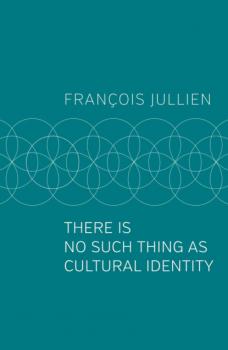Francois Jullien
Список книг автора Francois JullienThere Is No Such Thing as Cultural Identity
As people throughout the world react to globalization and revert to nationalism, they are proclaiming distinct cultural identities for themselves. Cultural identity seems to offer a defensive wall against the homogenizing effects of globalization and a framework for nurturing and protecting cultural differences. In this short and provocative book, François Jullien argues that this emphasis on cultural identity is a mistake. Cultures exist in relation to one another and they are constantly mutating and transforming themselves. There is no cultural identity, there are only what Jullien calls ‘resources’. Resources are created in a certain space, they are available to all and belong to no one. They are not exclusive, like the values to which we proclaim loyalty; instead, we deploy them or not, activate them or let them fall by the wayside, and each of us as individuals is responsible for these choices. This conceptual shift requires us to redefine three key terms – the universal, the uniform and the common. Equipped with these concepts, we can rethink the dialogue between cultures in a way that avoids what Jullien sees as the false debate about identity and difference. This powerful critique of the modern shibboleth of cultural identity will appeal to anyone interested in the great social and political questions of our time.
Resources of Christianity
Christianity is bound up with the very idea of the West: we cannot evade it even if we would like to. While many people no longer believe in Christianity, we cannot deny that it has left a deep imprint on Western thought. But how might we develop a philosophy of Christianity that is not a Christian philosophy? How can we take a view that is external to the traditions of apologetics and criticism? For there is a question that concerns us all here: are the coherences of Christianity still useful for thought, and especially for thought about existence? To address this question, François Jullien considers Christianity as constituting a set of resources. Resources are available to all and can be used by those who discover and exploit them; they belong to no one. Christianity offers us resources inasmuch as we can draw some benefit from it, inasmuch as it can be the source of an effect, without our having to believe it or determine its truth in advance. Jullien reads the Gospels, and especially the Gospel of John, as he would read any other text, seeking to account for the text's coherence (rather than its ‘meaning’), seeking to account for its pertinence (rather than its ‘truth’), but without any need to adhere – the exploitation of resources demands no conversion. And in reading the Gospel of John in this way, we discover the fertile veins of a theory of existence. This fresh and erudite reflection on Christianity will be of great value to anyone interested in religion and its relevance today.
Ein zweites Leben
Die Idee eines «zweiten Lebens», die François Jullien in Auseinandersetzung mit den Klassikern des chinesischen Denkens entwickelt, meint nicht Wiedergeburt oder neues Leben, sondern zeichnet einen Weg der stillen Verwandlung vor.
In diesem Essay lässt François Jullien die Begründer des Taoismus in einen Dialog mit europäischen Denkern treten. Dabei entwickelt er die Idee eines «zweiten Lebens»: Diskret und ohne Bruch findet eine Verschiebung in unserem Leben statt – es trifft nunmehr seine eigenen Entschlüsse und gestaltet sich um. Es belebt sich neu, kommt wieder in Gang, richtet seine Vorhaben und Ziele aus und gibt bislang unergründet gebliebene Möglichkeiten frei. Indem wir unsere Freiheit schrittweise entfalten, aus der Wiederholung heraustreten und Klarheit erlangen, leben wir fortan nicht mehr bloß, sondern beginnen zu existieren.




